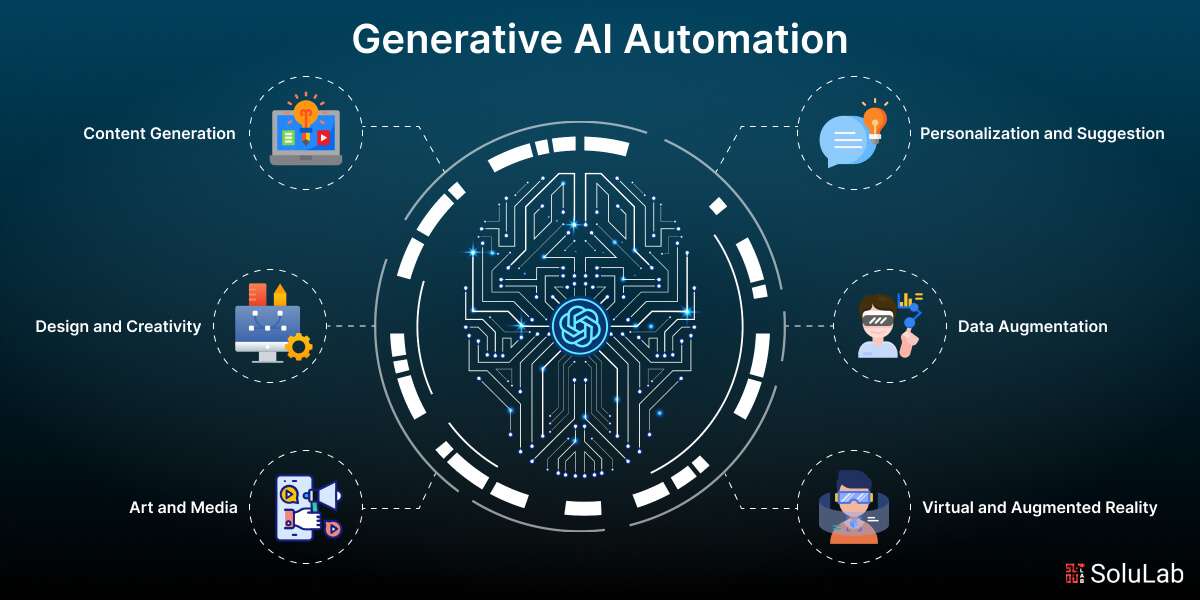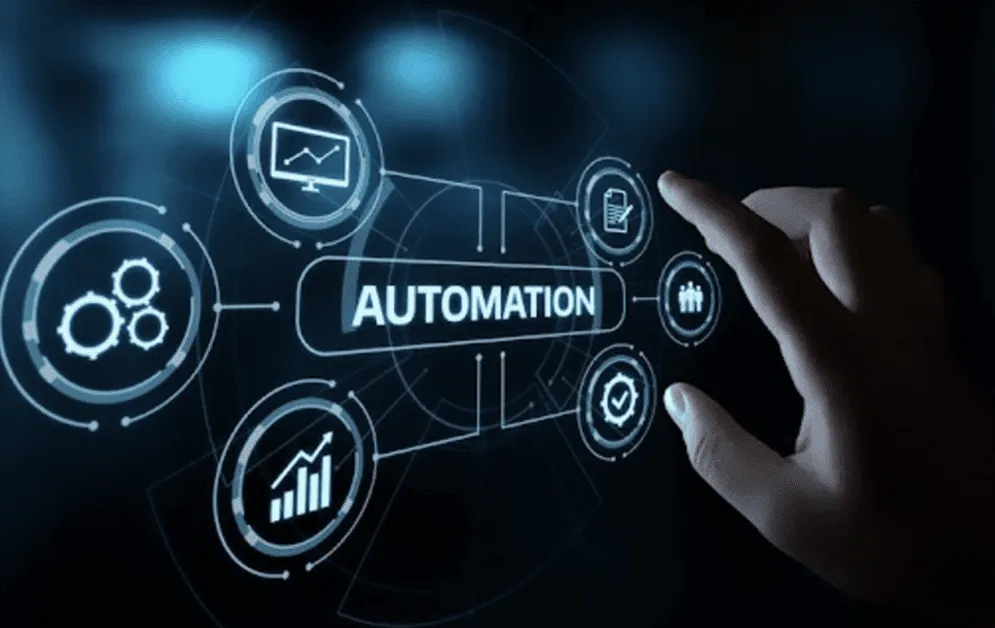AI Automation is transforming industries by enhancing efficiency and productivity. It leverages artificial intelligence to automate tasks, saving time and resources.
Imagine a world where mundane tasks are handled by intelligent systems. AI automation makes this possible. It’s not just about robots and machines. It’s about smart algorithms taking over repetitive jobs. This frees up humans to focus on creative and strategic work.
Businesses are seeing real benefits. Reduced errors, faster processes, and lower costs are just the beginning. AI automation is becoming crucial in various sectors. From manufacturing to healthcare, its impact is growing. In this blog, we will explore how AI automation is reshaping the workplace. Discover the advantages and potential challenges. Let’s dive into the world of AI automation.

Benefits Of Ai Automation
AI Automation is transforming how businesses operate. By integrating AI, companies can streamline processes and enhance productivity. The benefits of AI Automation are vast, touching on various aspects of business operations. Let’s explore some key advantages.
Cost Efficiency
AI Automation leads to significant cost savings. By automating repetitive tasks, businesses reduce labor costs. Efficiency Optimization means fewer resources are wasted. This allows companies to allocate funds more effectively.
Some ways AI Automation achieves cost efficiency include:
- Reducing manual labor – Less need for human intervention in repetitive tasks.
- Minimizing errors – Automated systems reduce the chances of costly mistakes.
- Optimizing resource usage – Better utilization of materials and energy.
Consider a manufacturing plant:
| Before AI Automation | After AI Automation |
|---|---|
| High labor costs | Reduced labor costs |
| Frequent errors | Minimal errors |
| Resource wastage | Optimal resource use |
Time Savings
AI Automation saves a lot of time. Workflow Automation speeds up processes by handling tasks faster than humans. This means employees can focus on more important tasks.
Artificial Intelligence Applications like Robotic Process Automation can work 24/7. This continuous operation leads to faster task completion. Here are some examples:
- Data Analysis – AI can analyze large data sets quickly.
- Predictive Analytics – AI predicts trends faster than manual methods.
- Process Improvement – AI identifies bottlenecks and improves workflows.
In customer service, AI chatbots handle queries instantly. This improves response time and customer satisfaction.
Improved Accuracy
AI Automation enhances accuracy in various tasks. Intelligent Automation reduces human errors. Machines follow set rules without deviation.
In fields like finance, Machine Learning algorithms can detect fraud. This leads to more accurate risk assessments. Some benefits of improved accuracy include:
- Consistent performance – Machines perform tasks consistently without fatigue.
- Better decision-making – Accurate data leads to better business decisions.
- Higher quality outputs – Automated systems produce high-quality results.
For example, in healthcare, AI can analyze patient data accurately. This leads to better diagnoses and treatments. Overall, ensures tasks are done correctly and efficiently.
Challenges In Ai Automation
Artificial Intelligence (AI) automation is transforming industries by streamlining tasks, increasing efficiency, and reducing human error. Yet, this brings several challenges. These include job displacement, data privacy concerns, and high implementation costs. Understanding these challenges is crucial for businesses aiming to integrate AI responsibly and ethically.
Job Displacement
AI automation can lead to workforce automation, replacing human roles with machines. This shift can cause significant job market impact, particularly in industries dependent on manual labor.
Some key points include:
- Robotic Process Automation (RPA) handles repetitive tasks.
- Machine Learning algorithms optimize operations, reducing the need for human intervention.
- Automation technology improves productivity but may lead to fewer job opportunities.
Workers in affected sectors may need to retrain for new roles. Ethical AI practices involve providing support for displaced workers. Companies should consider a cost-benefit analysis to balance automation benefits with its social impact.
Data Privacy
With AI integration, data privacy becomes a major concern. AI systems require vast amounts of data to function effectively. This raises issues related to data security and privacy breaches.
Important considerations include:
- Ensuring data is collected and stored securely.
- Implementing strict access controls.
- Complying with data protection regulations.
Businesses must adopt robust security measures to protect sensitive information. Regular audits and updates to security protocols are essential. Ethical AI practices demand transparency about data usage and privacy policies.
Implementation Costs
Implementing AI solutions involves significant investment. Costs can vary depending on the complexity and scale of the project.
Consider the following factors:
- Initial setup and infrastructure expenses.
- Ongoing maintenance and updates.
- Training employees to work with new technologies.
A thorough cost-benefit analysis helps businesses understand the financial commitment. While initial costs are high, the long-term benefits of increased efficiency and productivity can outweigh these expenses. Planning and budgeting are essential to manage these costs effectively.
Future Trends In Ai Automation
Artificial Intelligence (AI) automation is transforming the way businesses operate. By leveraging AI, companies can achieve higher efficiency and accuracy. With continuous advancements, AI automation is poised to bring even more significant changes in the future. This blog post explores future trends in AI automation, focusing on integration with IoT, advancements in machine learning, and regulatory developments.
Integration With Iot
AI automation and the Internet of Things (IoT) are increasingly intertwined. This combination allows for Smart Automation across various industries. IoT devices generate vast amounts of data. AI processes this data to make Data-Driven Decisions.
Benefits of integrating AI with IoT include:
- Improved Efficiency: AI optimizes IoT operations.
- Predictive Maintenance: AI predicts device failures.
- Enhanced Security: AI detects and responds to threats.
For example, in smart homes, AI can control IoT devices like thermostats and lights. This ensures energy efficiency and convenience. In manufacturing, AI monitors equipment health, reducing downtime.
Below is a table highlighting key applications:
| Industry | AI-IoT Application |
|---|---|
| Healthcare | Remote patient monitoring |
| Transportation | Autonomous vehicles |
| Agriculture | Smart farming |
Advancements In Machine Learning
Machine Learning (ML) is a subset of AI that enables systems to learn from data. Recent advancements in ML have significantly impacted Digital Transformation. Businesses leverage ML for Predictive Analytics and Natural Language Processing (NLP).
Notable advancements in ML include:
- Deep Learning: Mimics the human brain’s neural networks.
- Reinforcement Learning: Systems learn through trial and error.
- Transfer Learning: Uses pre-trained models for new tasks.
These advancements lead to more accurate predictions and efficient processes. For instance, in finance, ML algorithms analyze market trends. This helps in making informed investment decisions. In customer service, NLP enhances chatbots, providing better user experiences.
Below is a table showcasing ML advancements:
| ML Technique | Application |
|---|---|
| Deep Learning | Image and speech recognition |
| Reinforcement Learning | Robotic Process Automation (RPA) |
| Transfer Learning | Language translation |
Regulatory Developments
As AI automation grows, Regulatory Developments become crucial. Governments worldwide are crafting regulations to ensure ethical AI use. These regulations aim to protect privacy and ensure transparency.
Key aspects of regulatory developments include:
- Data Privacy: Laws like GDPR protect user data.
- Accountability: Ensuring AI decisions are explainable.
- Ethical AI: Preventing biased and discriminatory AI systems.
For example, the European Union’s AI Act sets standards for AI systems. It focuses on high-risk applications, ensuring they meet strict criteria. In the US, the National AI Initiative Act promotes safe AI innovation.
Below is a table summarizing regulatory frameworks:
| Region | Regulation |
|---|---|
| European Union | AI Act |
| United States | National AI Initiative Act |
| Global | OECD AI Principles |

Automation In You Tube And Blogging
The changing the way we create and manage content. From YouTube automation to blog automation, AI tools save time and increase productivity. This post explores how AI helps in these areas.
Automating Youtube Content
AI can automate various tasks on YouTube. Neural Networks and Deep Learning help in recommending videos. Robotic Process Automation can handle uploading videos and managing comments. Natural Language Processing helps in generating video descriptions. These tools make content creation easier.
Optimizing Video Recommendations
Cognitive Computing and Machine Learning analyze user preferences. These technologies suggest videos based on past behavior. This improves user engagement and retention. Predictive Analytics can forecast what viewers might like. This ensures that the right content reaches the right audience.
Streamlining Blog Writing
AI simplifies blog writing. Workflow Automation tools can manage the entire writing process. From drafting to publishing, every step can be automated. Data Analysis helps in understanding what topics resonate with readers. This ensures that content is relevant and engaging.
Generating Blog Content
Intelligent Automation can create content based on keywords. This saves time and reduces effort. Natural Language Processing ensures that the content is coherent and easy to read. These tools make blog automation efficient and effective.
Analyzing Blog Performance
AI tools can analyze blog performance. Predictive Analytics can forecast future trends. Data Analysis provides insights into reader behavior. This helps in optimizing content strategy. It ensures that the blog continues to attract readers.

Frequently Asked Questions
What Is Ai Automation?
AI uses artificial intelligence to perform tasks without human intervention. It increases efficiency, reduces errors, and saves time.
How Does Ai Automation Work?
AI automation works by using algorithms to analyze data and make decisions. It learns from patterns and improves over time.
Why Is Ai Automation Important?
Its is important because it boosts productivity and accuracy. It frees up human resources for more complex tasks.
Can Ai Automation Replace Jobs?
This can replace repetitive tasks but not all jobs. It often creates new opportunities for skilled workers.
Conclusion
AI automation is shaping our future in remarkable ways. Businesses gain efficiency and save time. People can focus on creative tasks. Though challenges exist, benefits are clear. Embracing AI can lead to growth and innovation. Stay informed and adapt to this evolving technology.
The future with AI holds immense potential. Make the most of its advantages today.

